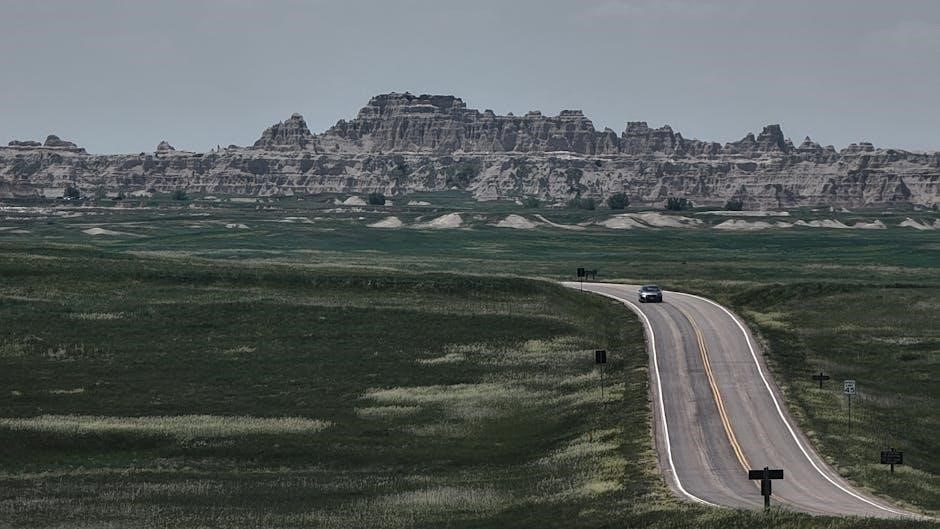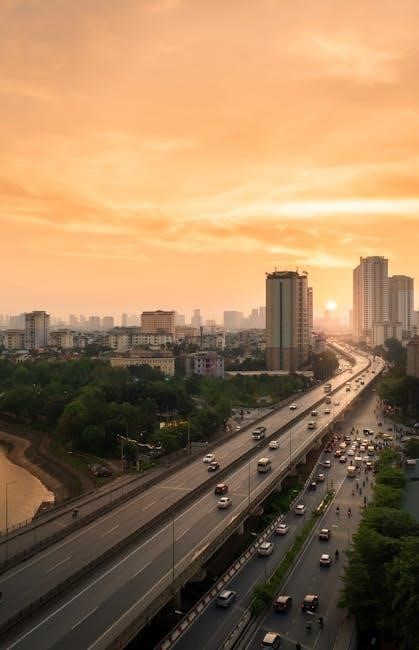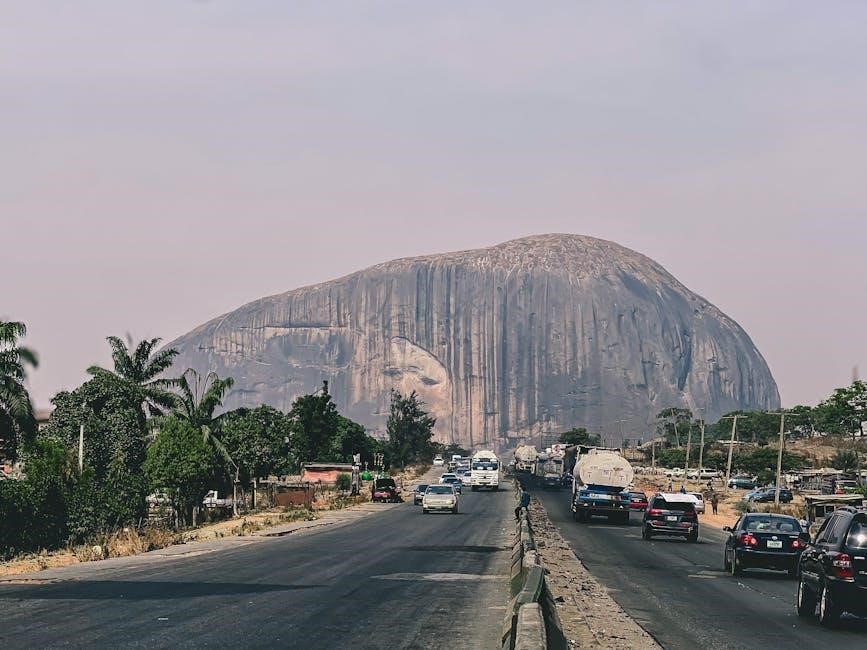Luis Alberto Urrea’s The Devil’s Highway recounts the tragic 2001 journey of 26 Mexican men crossing Arizona’s deadly desert, highlighting border issues and human resilience.
Overview of the Book
The Devil’s Highway by Luis Alberto Urrea is a gripping non-fiction account of a tragic event in May 2001, where 26 Mexican men attempted to cross the U.S.-Mexico border through the treacherous Arizona desert. The book vividly recounts their harrowing journey, the devastating consequences, and the broader implications of border policies. Urrea’s investigative reporting sheds light on the dangers faced by migrants and the human cost of crossing the “Devil’s Highway,” a region notorious for its extreme conditions. The narrative explores themes of survival, immigration, and the pursuit of a better life, making it a powerful critique of U.S. border policies and a testament to human resilience.
Author Background: Luis Alberto Urrea
Luis Alberto Urrea, born in 1955 in Tijuana, Mexico, to a Mexican father and American mother, is a renowned American author and poet. His unique bicultural heritage deeply influences his work, often exploring themes of identity, immigration, and the U.S.-Mexico border. Urrea earned a Bachelor of Arts in English from the University of California, San Diego, and later became a professor of creative writing at the University of Chicago. He has published numerous works, including novels, poetry, and non-fiction, earning accolades such as the Lannan Literary Award and being a finalist for the Pulitzer Prize for The Devil’s Highway. His writing is celebrated for its lyrical prose and unflinching examination of social and human rights issues.
The Historical Context of the Devil’s Highway
The Devil’s Highway is set against the backdrop of the U.S.-Mexico border, a region marked by harsh geography, complex politics, and a long history of migration. The area, known for its extreme heat and desolation, has been a deadly crossing point for decades. In the late 20th century, stricter border policies and increased enforcement in urban areas funneled migrants into remote desert regions like the Devil’s Highway. This shift, combined with the rise of smuggling networks, created a perilous environment for those seeking to cross. The 2001 incident highlights the tragic consequences of these policies and the desperate attempts to reach the U.S. in search of a better life.

The 2001 Incident
In 2001, 26 men attempted a perilous desert crossing through the Devil’s Highway, a notorious region in southern Arizona. Only 12 survived the harsh conditions.
The Group of 26 Men
In May 2001, a group of 26 Mexican men, including fathers, sons, brothers, and strangers, embarked on a dangerous journey across the U.S.-Mexico border. They were driven by the hope of finding better opportunities and higher wages in the United States. The group’s decision to attempt this perilous crossing was motivated by the harsh economic conditions in their homeland and the promise of a more prosperous life. This diverse group of individuals, united by their desire for a better future, faced unimaginable challenges as they ventured into one of the most unforgiving landscapes in North America.
The Desert Crossing Attempt
The 26 men attempted to cross the Arizona desert via the Devil’s Highway, a notorious region known for its extreme heat and lack of water. The group, guided by smugglers, faced severe conditions, including blistering temperatures and treacherous terrain. The harsh environment quickly took its toll, leading to dehydration and exhaustion. Despite their determination, the men were ill-prepared for the unforgiving landscape, and the journey became a desperate fight for survival. The desert’s brutality exposed the risks migrants undertake when seeking a better life, highlighting the dangerous realities of undocumented border crossings.
The Tragic Outcome
The desert crossing ended in devastating loss, as 14 of the 26 men perished, unable to endure the extreme conditions. The survivors, severely dehydrated and exhausted, were rescued and hospitalized. The tragedy underscored the perilous risks migrants face when attempting to cross the border. Luis Alberto Urrea’s account vividly captures the human cost of such journeys, revealing the heartbreaking consequences of seeking a better life. This event remains a stark reminder of the dangers associated with undocumented immigration and the harsh realities faced by those who attempt it.

The Journey and Its Challenges
The Devil’s Highway journey reveals the unforgiving desert terrain, extreme heat, and dehydration faced by migrants. The men’s resilience was tested as they battled nature and human failures.
The Geography of the Devil’s Highway
The Devil’s Highway traverses the Sonoran Desert, one of the most hostile landscapes in North America. The region’s extreme heat, often exceeding 100°F, and lack of shade or water make it a deadly environment. The terrain is characterized by vast sand dunes, rocky outcrops, and arid washes, creating a maze of challenges for migrants. The desert’s unforgiving conditions, combined with its remote location, make it nearly impossible to survive without proper supplies or guidance. The geography itself becomes a formidable obstacle, testing the endurance and will of those who attempt to cross it.
The Role of Smugglers
Smugglers played a pivotal role in the ill-fated journey, promising safe passage but delivering deception. They lured migrants with false assurances of easy crossing and adequate supplies. Many smugglers lacked knowledge of the desert, leading the group astray. Their greed and recklessness exacerbated the migrants’ vulnerability, abandoning them when conditions worsened. The smugglers’ actions were often driven by profit, disregarding the lives they endangered. This exploitation highlights the dangerous intersection of desperation and opportunism, where migrants, seeking a better life, became victims of betrayal. The smugglers’ role underscores the harsh realities of illegal crossings and the risks faced by those attempting to enter the U.S. illegally.
The Struggle for Survival
The migrants faced extreme dehydration, blistering heat, and a relentless desert landscape that tested their endurance. With limited water and food, they were forced to ration supplies, leading to severe physical and mental strain. The harsh terrain, combined with the vast expanse of the desert, made navigation nearly impossible. Many succumbed to the unforgiving environment, while others fought to stay alive, driven by the hope of reaching their destination. The struggle for survival was a grim reminder of the perilous journey undertaken by those seeking a better life, highlighting the resilience of the human spirit in the face of overwhelming adversity.

The Aftermath
The surviving men were rescued, but the incident sparked widespread outrage, prompting investigations into border policies and smuggling practices, while media coverage highlighted the human cost of migration.
Rescue Efforts and Survivors
The rescue efforts for the 26 men were led by U.S. Border Patrol and local volunteers, who found the survivors in critical condition, severely dehydrated and exhausted. Only 12 men survived the ordeal, while 14 perished in the harsh desert environment. The survivors were hospitalized and later interviewed by authorities, providing harrowing accounts of their journey. Their testimonies revealed the brutal realities of crossing the Devil’s Highway, including the failure of smugglers to provide adequate support. The rescue operation highlighted the dangers of illegal crossings and the need for humanitarian aid in such situations. The incident also raised questions about border enforcement and the treatment of migrants.
Investigation and Accountability
The incident sparked a thorough investigation into the circumstances surrounding the deaths and the role of smugglers. Authorities identified the smugglers involved, leading to their prosecution, though some remained at large. The U.S. Border Patrol faced scrutiny over their response, with questions raised about delays in alerting Mexican authorities. The investigation revealed systemic failures in border enforcement and the exploitation of migrants by criminal networks. Efforts were made to hold accountable those responsible, but the case also highlighted broader systemic issues in immigration enforcement and the need for reforms to prevent future tragedies. Accountability remained a challenge due to the complexity of cross-border operations and the elusive nature of smuggling rings.
Public Reaction and Media Coverage
The 2001 incident garnered significant media attention, shocking the public with its harrowing details. National and international outlets covered the story, focusing on the migrants’ suffering and the inhumane conditions they faced. Public reaction was a mix of outrage and empathy, with many calling for immigration reform and better protections for migrants. The media highlighted the broader implications of U.S. border policies and the dangers of illegal crossings. This coverage played a crucial role in raising awareness about the human cost of immigration and the need for systemic change to prevent future tragedies. The story became a rallying cry for advocacy groups and policymakers alike.

Themes and Messages
The Devil’s Highway explores themes of immigration, human rights, and the American Dream, highlighting the human cost of border policies and the resilience of those seeking a better life.
Immigration and Border Policy
The Devil’s Highway examines the harsh realities of immigration through the story of 26 Mexican men attempting to cross the U.S.-Mexico border in 2001. The book sheds light on the dangers faced by undocumented immigrants navigating the deadly Arizona desert, known as the “Devil’s Highway.” Urrea’s narrative critiques the U.S. border policies, emphasizing their failure to address the root causes of immigration. The tragic outcome—only 12 survivors—underscores the human cost of these policies, highlighting the need for reform. The book serves as a powerful critique of the legal and physical barriers that migrants face, urging readers to reconsider their perceptions of immigration.
HUMAN Rights and Dignity
The Devil’s Highway is a poignant exploration of the human rights violations faced by undocumented immigrants. Luis Alberto Urrea’s account of the 2001 tragedy highlights the dehumanizing conditions endured by the 26 men who attempted to cross the Arizona desert. The book emphasizes the inherent dignity of these individuals, often reduced to mere statistics in political debates. Urrea’s vivid storytelling humanizes their struggle, revealing the moral imperative to protect the rights of all people, regardless of their legal status. By exposing the harsh realities, the book advocates for compassion and justice, urging readers to recognize the humanity behind the headlines.
The American Dream and Its Cost
The Devil’s Highway delves into the paradox of the American Dream, revealing the high price undocumented immigrants pay for the promise of opportunity. The 2001 journey of 26 men across the Arizona desert symbolizes the desperate pursuit of a better life. Luis Alberto Urrea’s narrative exposes the harsh realities faced by those seeking prosperity, often at the cost of their lives. The book critiques the illusion of an attainable utopia, juxtaposing it with the brutal sacrifices made by those who dare to chase it. This theme underscores the moral complexity of migration, urging readers to reflect on the true value of a nation’s ideals;

Literary Significance
The Devil’s Highway is a Pulitzer Prize finalist, praised for its vivid storytelling and emotional depth, raising awareness about immigration and human rights through its compelling narrative.

Awards and Recognition
The Devil’s Highway earned Luis Alberto Urrea a Pulitzer Prize nomination for nonfiction, showcasing its literary excellence. It also received the Lannan Literary Award and the Arizona Book Award, solidifying its impact on contemporary literature. The book’s vivid storytelling and investigative depth have been widely acclaimed, making it a landmark work in nonfiction. Its recognition highlights Urrea’s mastery in blending narrative with social commentary, further cementing its place in discussions about immigration and human rights. These accolades underscore the book’s ability to resonate with readers and inspire meaningful dialogue about critical issues.
Reception by Critics and Readers
The Devil’s Highway received widespread critical acclaim for its gripping narrative and profound social commentary. Critics praised Urrea’s investigative depth and lyrical prose, calling it a “saga on the scale of the Exodus” and a “brilliant work of nonfiction.” Readers were deeply moved by the harrowing true story, with many highlighting its emotional impact and thought-provoking themes. The book has been lauded for humanizing the immigrant experience and sparking essential conversations about border policies and human rights. Its accessibility and literary excellence have made it a favorite among both critics and readers, solidifying its place in contemporary literature. The Atlantic described it as “the most compelling account of U.S. border policy absurdity,” further underscoring its resonance.
Impact on Public Discourse
The Devil’s Highway has profoundly influenced public discourse on immigration and border policies. By exposing the harrowing realities faced by migrants, Urrea’s work sparked widespread outrage and calls for reform. The book humanized the lives of undocumented immigrants, shifting perceptions from statistics to stories of resilience and tragedy. Its vivid narrative has been credited with reshaping conversations about human rights and the failures of border enforcement. The Pulitzer Prize finalist status further amplified its reach, making it a catalyst for advocacy and policy debates. The book’s impact continues to resonate, urging readers to confront the moral and political complexities of immigration. Its influence remains a powerful call for empathy and change.

Personal Reflections
The Devil’s Highway evokes deep personal reflections on humanity, resilience, and the pursuit of a better life, urging readers to confront the harsh realities of migration and survival.
The Author’s Perspective
Luis Alberto Urrea’s perspective in The Devil’s Highway is deeply personal and empathetic, blending his Mexican-American identity with a journalist’s rigor. He humanizes the migrants, moving beyond statistics to reveal their individual stories, struggles, and dignity. Urrea’s narrative voice is both compassionate and critical, highlighting the dangers of the desert, the exploitation by smugglers, and the failures of border policies. His intent is not just to document the tragedy but to challenge readers to confront the complexities of immigration and the human cost of crossing the Devil’s Highway. His perspective adds depth and urgency to the story, making it a powerful call for understanding and change.
Survivors’ Stories
The survivors of the Devil’s Highway crossing shared harrowing accounts of their ordeal, revealing the immense physical and emotional toll of the journey. Many spoke of extreme dehydration, the blistering sun, and the agonizing deaths of their companions. Their stories highlight the resilience and desperation that drove them to attempt the crossing despite the known dangers. The survivors’ testimonies provide a poignant glimpse into the human cost of border policies and the enduring hope for a better life that motivates such risky endeavors. Their narratives serve as a testament to the strength of the human spirit in the face of overwhelming adversity.
Lessons Learned
The Devil’s Highway tragedy underscores the dire human cost of dangerous border crossings and flawed immigration policies. It highlights the exploitation by smugglers and the sheer desperation driving individuals to risk their lives. The incident reveals systemic failures in border enforcement and the need for compassionate reform. Survivors’ resilience and the solidarity shown among them emphasize the strength of the human spirit. The story serves as a stark reminder of the ethical imperative to address migration with empathy and dignity, ensuring such tragedies are not repeated. It calls for a balanced approach to security and humanity, fostering safer pathways for those seeking a better life.
The Devil’s Highway leaves a lasting impact, urging readers to reflect on immigration policies and human dignity. Its legacy amplifies the voices of those lost and survived.
Final Thoughts on the Devil’s Highway
The Devil’s Highway is a haunting yet profound narrative that captures the harrowing journey of 26 men seeking a better life. Through meticulous research and lyrical prose, Luis Alberto Urrea sheds light on the harsh realities faced by migrants in the Arizona desert. The book not only honors the memory of those who perished but also sparks crucial conversations about immigration policies and human rights. By blending personal stories with broader societal issues, Urrea creates a compelling and emotional account that resonates long after the final page. The legacy of The Devil’s Highway lies in its ability to humanize the struggles of undocumented immigrants, urging readers to reflect on the moral and ethical implications of border policies.
The Legacy of the Book
The Devil’s Highway has left an indelible mark on contemporary literature and public discourse. As a finalist for the Pulitzer Prize, it has been widely acclaimed for its investigative depth and emotional resonance. The book’s ability to humanize the plight of migrants has made it a critical resource for discussions on immigration reform and human rights. Its impact extends beyond academia, influencing policymakers and inspiring advocacy efforts. By chronicling the tragic events of 2001, Urrea’s work ensures that the voices of those who suffered are not forgotten, while also challenging readers to confront the complexities of border politics. The Devil’s Highway remains a powerful call to action for a more compassionate and just immigration system.
Call to Action for Change
The Devil’s Highway serves as a powerful call to action, urging readers to demand more compassionate and equitable immigration policies. By exposing the harsh realities faced by migrants, Urrea underscores the urgent need for reform. The book challenges society to recognize the humanity behind the statistics and to advocate for dignity and justice for all. Available in PDF and other formats, The Devil’s Highway continues to inspire dialogue and mobilize efforts toward creating a more just and humane immigration system. Its enduring impact lies in its ability to transform outrage into action, ensuring that the voices of the vulnerable are heard and valued. Change begins with awareness, and this book is a vital catalyst for that change.